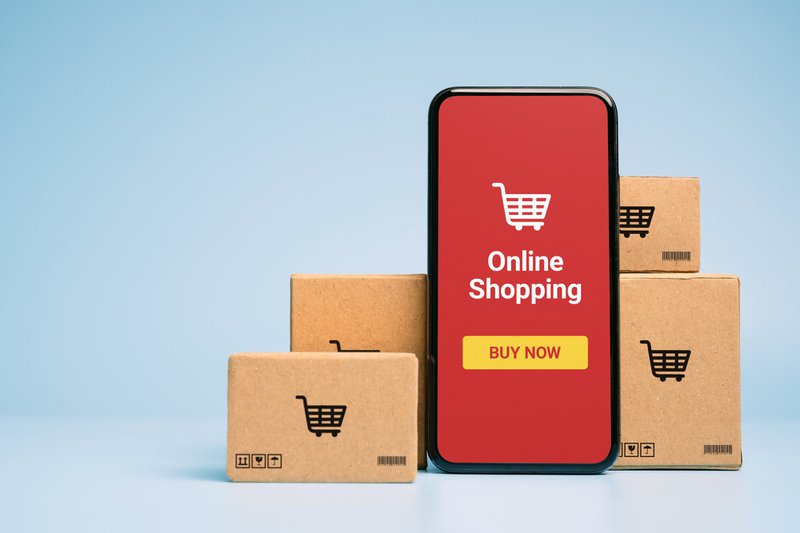With the rapid shift to “contactless” digital channels (accelerated by COVID-19), businesses without an online presence are struggling to stay afloat. Those with an eCommerce platform continue to remain profitable, with a recent survey finding that 80% of B2B companies with eCommerce sites are performing better than they were before the pandemic.
To successfully navigate these market disruptions, B2B businesses require a digital sales channel so they can remain competitive and meet ever-changing customer needs. With B2B eCommerce sales in the US projected to reach $1.8 trillion by 2023, businesses must understand this reality and plan accordingly. Whether you choose a turnkey eCommerce platform or decide to build/rebuild your website from scratch, you need to consider factors such as business goals, cost, payment integration, and analytics.
Smart implementation of B2B eCommerce solutions will boost sales and revenue, putting distance between you and your competitors. So, whether you’re a manufacturer or wholesaler, this is the right time to hop on the B2B eCommerce train.
Here’s how to do this…
Do Your Research and Get Buy-In From Your Team and Stakeholders
A program driven mainly by the marketing or IT departments—and not by the executive branch or sales team—is destined to fail. Similarly, if you don’t have support across your entire organization, your eCommerce site will not yield the business impact you expect.
Assembling an internal team to develop a business case that outlines the goals, benefits, and expected ROI for your new eCommerce venture is a good place to start. This should include short- and long-term goals, as well as projections about conversion rates. When you've built your business case and secured executive and sales support, you can then prioritize next steps.
eCommerce isn’t just about technology. It also has a lot to do with the people and processes that keep your strategy on track. Devote time and resources to train your staff (and customers) on the benefits of buying online. And don’t forget to reach out to employees for input: they may have suggestions that can further improve customer service, employee satisfaction, and efficiency.
An effective eCommerce solution gives you a competitive advantage. While the process may take some time and effort up front, investing in one can pay handsome dividends, justifying the acquisition of a productive asset that can help drive growth. The reality is that today’s customers live online 24/7… you should too.
Gather Key Information and Set-Up a Business Plan for B2B eCommerce

An eCommerce platform is not a stand-alone system. It requires a team effort to implement and manage an eCommerce site, so start by enlisting key department leads to help with the implementation planning and process.
Discuss your requirements with your IT department, as well as what components the commerce software must have to integrate with your internal systems. Moreover, your eCommerce platform needs to be flexible enough to support any future upgrades and changes to your organization's technology suite.
Your website's primary purpose is to serve your customers and a successful eCommerce site is built on a foundational functionality that ensures optimal usability, making the customer buying journey seamless. You need to reach out to customers and ask them how your future eCommerce site can enhance their experience because ultimately, these are the buyers that’ll drive your company’s growth. Find out what works, what doesn't, and what offerings they would like to see.
Choosing the Right B2B eCommerce Solution Partner

Choosing the right B2B eCommerce solution partner is a critical decision for any company seeking growth in this ever-changing industry. There are many considerations to take into account when looking for a competent and qualified team, but the key consideration is to ensure your partner has proven experience with all aspects of eCommerce, along with a track record to match.
They should be able to implement an eCommerce solution that is easy to navigate, but powerful enough to host hundreds of thousands of products and provide support for unique B2B purchasing and payment processes. Vendors can differ in terms of features offered, technical expertise, and level of support. Look for one that understands your base platform inside and out before they pitch you customizations.
A good solution provider will suggest out-of-the-box plug-ins and integrations (as opposed to customizations) whenever possible. Why? Well, because the more you customize an eCommerce platform, the more likely you are to spend more, run into headaches down the road when you need to update or migrate the site, and the more dependent you will be on that partner. Customizations, usually, make sense when you want to build bridges to other systems. In short, the right solution partner will know your platform well and provide expert advice on out-of-the-box vs. customized solutions.
Important questions to ask to determine if a prospective partner is a right fit for your business include:
- Can you integrate our preferred platform with our ERP? This may be one of the most important factors to consider. It is imperative that the prospective vendor has the technical capability (via an open API) for integration with your existing systems and other applications you may be using.
- Would you suggest an all-in-one or modular platform? Important as it will impact the level of investment complexity. Modular platform providers will often charge extra for every module, so it’s crucial to clear this up early.
- How many products should the system be able to house and manage? B2B eCommerce platforms should have no problem handling complex transactions across catalogs that contain hundreds of thousands of stock-keeping units or SKUs.
- Do you also offer product content services? Some vendors provide services that help enrich product descriptions, specs, attributes, and related content (images, videos, manuals, etc.). High-quality content attracts buyers to your site and helps drive conversion rates.
Other key considerations include price, time to deliver, and references. The vendor should be able to manage secure and PCI compliant payment methods, product data, online sales reports, and enable eCommerce functionality like upselling and catalog search. A credible provider should be able to provide reasonable answers to these and any questions you may have. The more transparent the solution provider is, the less likely you are to run into unpleasant surprises down the line.
Automation is key—rather than managing orders, reps can focus on managing customer relationships better. This freedom from manual processes cuts lengthy shipping and delivery schedules and raises customer satisfaction levels. A customized website developed by a B2B eCommerce solution provider will likely require a serious investment. But the payback is that you get complete control over the appearance, usability, navigation, and other aspects of your eCommerce platform.
With more and more B2B businesses looking to revitalize their brands with a modern eCommerce user experience, Zobrist will help you connect to your target audience with a mobile, responsive, and fast-loading website complete with the business tools for inventory management, fulfillment, ERP and more to streamline your back-office operations. Multiple payment options, multiple languages, and upsell offers are just a few of the integrations that Zobrist offers.
Our integrated solutions—with a built-in eCommerce Analytics package that lets you use Google Analytics, Adobe Analytics, and Coremetrics to monitor user behavior and interactions to optimize your digital storefront—enable companies to develop and grow their digital commerce footprint, compete for market share at a global level, and boost revenue.
Zobrist has a proven track record of developing eCommerce shopping experiences with the latest commerce, analytics, and payment technologies. We work with clients such as Vans, North Face, Mazda, and 3M to build conversion-oriented e-commerce storefronts using popular platforms, including HCL Commerce, Adobe Magento, Elastic Path, Salesforce, and many more.
Familiarize Yourself with Popular Implementation Models

You have a range of deployment models to choose from for your eCommerce solution. Each infrastructure differs in terms of what it offers and what it does not. The question then: whether to build or buy?
In an on-premise deployment, you run the eCommerce site directly from your facilities. This requires hardware, software, and technical expertise. As the traditional method, on-premise installations can cater to exacting needs with complete customizability, but cost more in time and effort than the alternatives.
In a cloud deployment scenario, you rent a service rather than buy your own equipment. This offers faster and less expensive start-up, as well as easy backups and updates. There are varying categories of cloud deployment that match most needs, such as a full eCommerce solution versus infrastructure only. The downside? You sacrifice some customizability. There are also hybrid solutions that combine the advantages and disadvantages of both choices.
Which deployment model is right for you? You have to weigh your budget, technical capacity, and other situational factors to decide. Any of the above can work, it’s a matter of applying it to your unique situation.
Powerful eCommerce Experiences to Drive Growth
Do you want to get ahead of your competitors and attract new customers? Or do you want to encourage repeat orders from existing customers? In either case, developing and implementing a B2B eCommerce solution can be challenging, but need not be.
Zobrist offers a complete B2B eCommerce solution, building branded and customized storefronts based on needs and target demographics to significantly enhance your customer experience and drive growth. We specialize in creating fast, secure, and mobile responsive eCommerce websites tailored to B2B commerce needs that can be integrated with popular eCommerce platforms, such as HCL Commerce, Magento, and Salesforce B2B.
With 20 years of experience and over 100 successful projects, Zobrist understands your business needs and recommends ready-made solutions instead of expensive customizations. When you need a partner to implement an eCommerce solution that’ll drive growth, think Zobrist!




